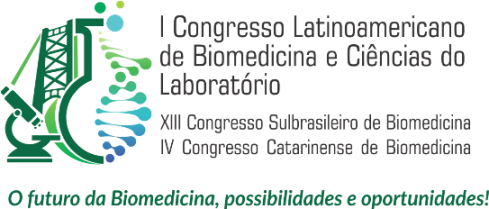Dados do Trabalho
Título
DOENÇAS CAUSADAS PELA ATIVAÇAO INCORRETA DO SISTEMA COMPLEMENTO
Fundamentação/Introdução
O sistema complemento é composto por diversas proteínas plasmáticas e é um importante mecanismo de defesa da imunidade inata e adquirida. Esse sistema fornece uma eficaz proteção contra patógenos, além disso, exerce funções fisiológicas e homeostáticas como na eliminação de células mortas e na remoção de complexos imunes.
Objetivos
Descrever e discutir as causas e consequências da deficiência do sistema complemento e relacioná-las com múltiplas patologias.
Delineamento e Métodos
Trata-se de uma revisão bibliográfica de aspecto descritivo, onde possibilita a discussão das causas e consequências da deficiência do sistema complemento e relacioná-las com diferentes patologias. A pesquisa foi elaborada a partir dos descritores: deficiência do sistema complemento, imunodeficiência, sistema complemento e complementopatias. tendo como base de dados artigos publicados em Literatura LatinoAmericana e do Caribe em Ciências da Saúde (LILACS), PubMed, Scientific Electronic Library Online (SciELO) e NCBI que foram publicados nos últimos 5 anos.
Resultados
A associação do complemento e doenças foram observadas em situações de deficiência do sistema complemento, anormalidades na regulação e nas inflamações. Mutações genéticas ou aumento do consumo do complemento leva a ativação imprópria ou excessiva do complemento, podendo levar a consequências lesivas e ao desenvolvimento de diversas doenças como lúpus eritematoso sistêmico, síndrome urêmica hemolítica atípica, glomerulopatia C3, hemoglobinúria paroxística noturna, glomerulonefrite pós infecciosas, artrite reumatoide e entre outras.
Conclusões/Considerações Finais
É evidente a participação do sistema complemento na patogênese e patogenia de diferentes doenças. O investimento em estudos que visam melhor entender o papel deste mecanismo pode contribuir para o desenvolvimento de intervenções terapêuticas ou a cura de diversas doenças, melhorando a qualidade de vida das pessoas acometidas.
Referências
ASIF, A.; NAYER, A.; HAAS, C. S. Atypical hemolytic uremic syndrome in the setting of complement-amplifying conditions : case reports and a review of the evidence for treatment with eculizumab. Journal of Nephrology, 2016.
BAINES, A. C.; BRODSKY, R. A. Blood Reviews Complementopathies, 2017.
BETSCHEL, S.; BADIOU, J.; BINKLEY, K.; et al. IMMUNOLOGY Canadian hereditary angioedema guideline. p. 1–18, 2014.
BRODSKY, R. A. Paroxysmal nocturnal hemoglobinuria. v. 124, n. 18, p. 2804–2812, 2016.
COUSER, W. G. Pathogenesis and treatment of glomerulonephritis. University of Washington, p. 107–122, 2016.
FAKHOURI, F.; HOURMANT, M.; CAMPISTOL, J. M.; VI, P.; ISTITUTO, I. Terminal Complement Inhibitor Eculizumab in Adult Patients With Atypical Hemolytic Uremic Syndrome: A Single-Arm, Open-Label Trial. p. 1–10, 2016.
GRUMACH, A. S.; KIRSCHFINK, M. Are complement deficiencies really rare? Overview on prevalence, clinical importance and modern diagnostic approach. Molecular Immunology, 2014.
HOLERS, V. M.; BANDA, N. K. Complement in the initiation and evolution of Rheumatoid Arthritis, 2018.
J. HERRMANN, K. J. ET AL. Complement C5a Receptor 1 Exacerbates the Pathophysiology of N. meningitidis Sepsis and Is a Potential Target for Disease Treatment. v. 9, n. 1, 2018.
JÓZSI, M. Self-Damage Caused by Dysregulation of the Complement Alternative Pathway : Relevance of the Factor H Protein Family. v. 9, n. July, p. 1–19, 2018.
LEF, J.; BENGTSSON, A. A.; BLOM, A. M. The complement system in systemic lupus erythematosus : an update, 2014.
LEWIS, L. A.; RAM, S.; LEWIS, L. A.; RAM, S. Meningococcal disease and the complement system. p. 37–41, 2014.
LINTNER, K. E.; PATWARDHAN, A.; RIDER, L. G.; et al. Gene copy-number variations ( CNVs ) of complement C4 and C4A deficiency in genetic risk and pathogenesis of juvenile dermatomyositis Study populations. , p. 1–8, 2015.
LINTNER, K. E.; WU, Y. L.; YANG, Y.; et al. Early Components of the Complement Classical Activation Pathway in Human Systemic Autoimmune Diseases. v. 7, n. February, p. 1–22, 2016.
LÓPEZ-LERA, A.; CORVILLO, F.; NOZAL, P.; et al. Complement as a diagnostic tool in immunopathology. Seminars in Cell and Developmental Biology, 2018.
MARINOS C. DALAKAS, M. D. Inflammatory Muscle Diseases, 2015.
MEDJERAL-THOMAS, N. R.; SHAUGHNESSY, M. M. O.; REGAN, J. A. O.; et al. Article C3 Glomerulopathy : Clinicopathologic Features and Predictors of Outcome. v. 9, n. 10, 2014.
SETHI, S.; FERVENZA, F. C.; ZHANG, Y.; et al. Atypical postinfectious glomerulonephritis is associated with abnormalities in the alternative pathway of complement. , p. 293–299, 2012.
VARELA, J. C.; TOMLINSON, S. Complement. An Overview for the Clinician. Hematology/Oncology Clinics of North America, v. 29, n. 3, p. 409–427, 2015.
VAUGHT, A. J.; GAVRIILAKI, E.; HUEPPCHEN, N.; et al. Direct evidence of complement activation in HELLP syndrome : A link to atypical hemolytic uremic syndrome. Experimental Hematology, v. 44, n. 5, p. 390–398, 2016. ISEH - International Society for Experimental Hematology.
VIECCELI, D.; PIRES, M.; SCHNEIDER, L.; et al. Original article Correlation between cellular expression of complement regulatory proteins with depletion and repopulation of B-lymphocytes in peripheral blood of patients with rheumatoid arthritis treated with rituximab. Revista Brasileira de Ortopedia (English Edition), p. 1–7, 2016.
WALFORD, H. H.; ZURAW, B. L. Current update on cellular and molecular mechanisms of hereditary angioedema. Annals of Allergy, Asthma & Immunology, v. 112, n. 5, p. 413–418, 2014.
ZHAO, W.; DING, Y.; LU, J.; et al. Genetic analysis of the complement pathway in C3 glomerulopathy. Nephrology Dialysis Transplantation, , n. March, p. 1–9, 2018.
ZUCKERMAN, R.; ASIF, A.; COSTANZO, E. J.; 2, T. V. Complement activation in atypical hemolytic uremic syndrome and scleroderma renal crisis : a critical analysis of. p. 77–81, 2017.
Palavras-chave
Sistema complemento; Deficiência do sistema complemento; Imunodeficiência.
Área
Tema livre
Instituições
Universidade Paulista - Goiás - Brasil
Autores
Ana Claudia Goulart Ferreira , Juliana Menara Souza Marques, Xisto Sena Passos, Milton Camplesi Junior, Lucas Luiz Lima Silva
